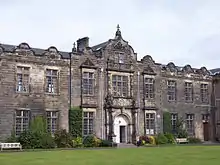St Mary's College, St Andrews
St Mary's College, founded as New College or College of the Assumption of the Blessed Virgin Mary, is the home of the Faculty and School of Divinity within the University of St Andrews, in Fife, Scotland.
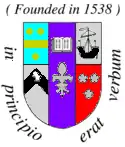 | |||||||||||||||||||||
| Latin: Collegium Sanctae Mariae | |||||||||||||||||||||
| Motto | Latin: IN PRINCIPIO ERAT VERBUM (In the Beginning was the Word) | ||||||||||||||||||||
|---|---|---|---|---|---|---|---|---|---|---|---|---|---|---|---|---|---|---|---|---|---|
| Type | College | ||||||||||||||||||||
| Established | 1538 | ||||||||||||||||||||
| Principal | Stephen R. Holmes | ||||||||||||||||||||
| Students | 98[1] | ||||||||||||||||||||
| Undergraduates | 60 | ||||||||||||||||||||
| Postgraduates | 50 | ||||||||||||||||||||
| Location | , , 56.3391°N 2.7945°W | ||||||||||||||||||||
| Teaching staff | 20[1] | ||||||||||||||||||||
| Colours | |||||||||||||||||||||
| Affiliations | University of St Andrews | ||||||||||||||||||||
| Website | www.st-andrews.ac.uk/divinity/ | ||||||||||||||||||||
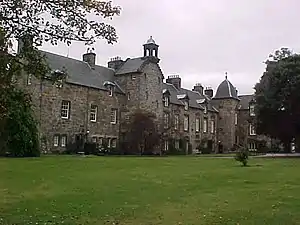
History
The college was founded in 1538 by Archbishop James Beaton, uncle of Cardinal David Beaton on the site of the Pedagogy or St John's College (founded 1418).[2][3]
St Mary's College was intended to preserve the teachings of the Catholic church against the Protestant teachings of the reformers. It was dedicated to a revival of learning on the Continental trilingual model and from the outset laid emphasis on the knowledge of Latin, Greek and Hebrew. In 1579, nineteen years after the Reformation brought fundamental changes to the religious life of the Scottish nation, St Mary's College was reconstituted, under the influence of Andrew Melville, as the Faculty of Divinity of the university.[4]
At its foundation in 1538 St Mary's was intended to be a College for instruction in Divinity, Law, and Medicine, as well as in Arts, but its career on this extensive scale was short-lived. Under a new foundation and erection, confirmed by Parliament in 1579, it was set apart for the study of Theology only, and it has remained a Divinity College ever since. From 1580 onwards each Principal has acted as primarius Professor of Divinity, or first Master.[5]
St Mary's College retains much of its original sixteenth century buildings, specifically the north and West ranges. The Quad contains a thorn tree said to have been planted by Mary, Queen of Scots, during her many visits to St. Andrews. The Quad also contains the historic King James Library founded by King James VI & I in 1612.[6] In addition the College has The Roundel, a 16th-century building dedicated for doctoral students studying divinity at the University of St Andrews.
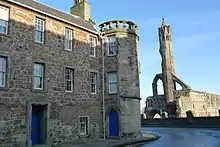
The college is one of five approved centres for the training of Church of Scotland ministers. Graduates include the Very Rev Dr Finlay Macdonald, the immediate past Principal Clerk to the General Assembly of the Church of Scotland and a former Moderator.[7]
As of 1 May 2018, the Principal of St Mary's College was Rev. Dr. Stephen Holmes, also Head of the School of Divinity, who had replaced Ian Bradley (Professor Emeritus).[8][9]
Rankings
As of May 2015, the Faculty and School of Divinity forms an academic community of some 131 persons: 16 members of staff; 55 postgraduate students; and 60 undergraduates. According to The Complete University Guide 2016 the School of Divinity is placed first in the United Kingdom for undergraduate studies ahead of Durham in second place and Cambridge in third.[10] In the 2016 Guardian University Guide it is also ranked first in the United Kingdom in religious studies and theology.[11]
Centres
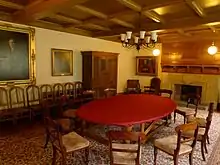
The college has four research centres.
The Institute for Theology, Imagination and the Arts (ITIA) was founded within the college by professors Trevor Hart and Jeremy Begbie (currently Thomas A. Langford Research Professor at Duke Divinity School) in 2000. It "aims to advance and enrich an active conversation between Christian theology and the arts – bringing rigorous theological thinking to the arts, and bringing the resources of the arts to the enterprise of theology."[12] The current director is Dr Gavin Hopps.
The Centre for the Study of Religion and Politics (CSRP) was founded in November 2004 by a group of academics attached to the Schools of Divinity, International Relations, Modern Languages, and Philosophical and Anthropological Studies. The need for a centre of learning to consider the role of religion and politics was highlighted by the support garnered from a diverse range of scholars and religious and political figures who endorsed the Centre's establishment. These supporters who have continued as Patrons of the Centre include Gustavo Gutiérrez, Cardinal O'Brien, Bishop Desmond Tutu, Carole Hillenbrand, Ian Linden, Julian Filochowski, J.D.Y. Peel, Rev Joel Edwards, Professor George P. Smith II[13] and Dr. P.T.W. Baxter.[14][15][16] The current director is Professor Mario Aguilar
The Institute for Bible, Theology & Hermeneutics (IBTH) was established in 2009 to give formal identity to the long-standing project of research into Scripture and theology that has been associated with the work at St Mary's School of Divinity. The institute introduces its aims as seeking, "To overcome the sense of fragmentation within the field of Divinity that burdens many within the Academy, promoting intra-disciplinary conversation between Biblical Studies and the various fields of Theology, thus providing a core identity for a more integrated discipline competent to engage in inter-disciplinary research. With the study of general hermeneutical theory and practice at its centre, it will be outward-looking and keen to engage with issues arising from the contemporary world."[17] The current director is Dr Mark Elliott.
The Logos Institute for Analytic and Exegetical Theology[18] was founded in 2016 by Professor Alan Torrance and Dr Andrew Torrance.[19] The Institute "is committed to scholarship that reflects a concern for: transparency; simplicity in expression; clear, logical argumentation; and rigorous analysis. It also reflects a radical commitment to interdisciplinary engagement, particularly between the fields of philosophy, theology, biblical studies, and the sciences. Its faculty[20] consists of world-leading scholars in the fields of biblical studies, theology, and philosophy."[21] The current director is Professor Alan Torrance.
Notable Faculty
- Andrew Melville, various posts including Rector of the University 1590-1597[22]
- Samuel Rutherford, Professor of Divinity 1638-1661
- James Hadow, Principal of the college 1707-1747
- Thomas Halyburton, Professor of Divinity 1710-1712
- Rev Prof Allan Menzies Professor of Biblical Criticism 1869 to 1916
- Very Rev John Cunningham Principal - Moderator of the General Assembly in 1886
References
- "Archived copy". Archived from the original on 2006-09-11. Retrieved 2006-09-09.CS1 maint: archived copy as title (link)
- St John's College, St Andrews
- "Records of St Mary's College". Special Collections. University of St Andrews. Retrieved 19 February 2017.
In February 1537/8 Archbishop James Beaton (died 1539) founded 'the College of the Assumption of the Blessed Virgin Mary' on the site of the pedagogy of the University of St Andrews in South Street.
- Scott, Hew (1928). Fasti ecclesiae scoticanae; the succession of ministers in the Church of Scotland from the reformation. 7. Edinburgh: Oliver and Boyd. pp. 416–434. Retrieved 8 July 2019.
 This article incorporates text from this source, which is in the public domain.
This article incorporates text from this source, which is in the public domain. - Scott 1928, p. 416.
- "St Mary's - Library Facilities". Archived from the original on June 7, 2007.
- "Archived copy". Archived from the original on 2010-02-10. Retrieved 2010-10-30.CS1 maint: archived copy as title (link)
- "About St Mary's College | School of Divinity, University of St Andrews". www.st-andrews.ac.uk. Retrieved 2018-05-01.
- "Graduation address Professor Ian Bradley | University of St Andrews". www.st-andrews.ac.uk. Retrieved 2018-05-01.
- "Top UK University League Tables and Rankings 2020". www.thecompleteuniversityguide.co.uk.
- "Religious studies and theology". The Guardian. 2 May 2015.
- "Archived copy". Archived from the original on 2011-02-09. Retrieved 2011-03-18.CS1 maint: archived copy as title (link)
- Smith, George Patrick (2008). Distributive Justice and the New Medicine. United Kingdom: Edward Elgar Publishing. ISBN 978-1-84720-757-9.
- http://www.st-andrews.ac.uk/divinity/rt/csrp/patrons/
- http://www.scotsman.com/news/scottish-news/edinburgh-east-fife/religion_and_politics_take_centre_stage_1_961120
- "Tutu is named patron at centre". The Herald (Glasgow). 7 Oct 2005.
- http://www.st-andrews.ac.uk/divinity/rt/instituteforbibletheologyhermeneutics/
- "Logos – Institute for Analytic and Exegetical Theology". logos.wp.st-andrews.ac.uk.
- "Andrew Bartholomew Torrance - University of St Andrews". risweb.st-andrews.ac.uk.
- "Faculty – Logos". logos.wp.st-andrews.ac.uk.
- "Logos – Institute for Analytic and Exegetical Theology". logos.wp.st-andrews.ac.uk. Retrieved 2019-02-01.
- Holloway, Ernest, R. (2011). Andrew Melville and Humanism in Renaissance Scotland 1545-1622. Leiden, Boston: Brill. pp. 1–388.
External links
 Media related to St Mary's College, St Andrews at Wikimedia Commons
Media related to St Mary's College, St Andrews at Wikimedia Commons- Official website
- ITIA website
